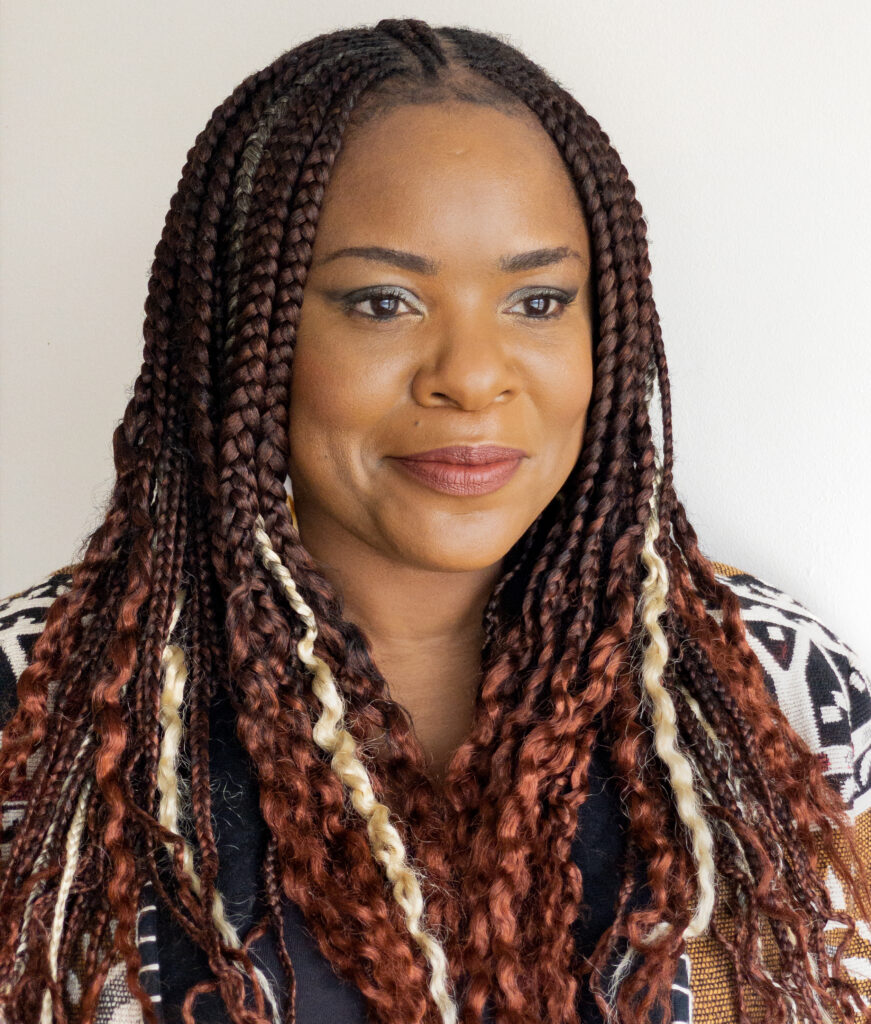Nana Nkweti is the author of the story collection Walking on Cowrie Shells. An AKO Caine Prize finalist and alumna of the Iowa Writers’ Workshop, her work has garnered fellowships from MacDowell, Kimbilio, Ucross, and Clarion West, among others. She has studied international law and trained and practiced as a nurse, and is now a professor of English at the University of Alabama.
***
From “Night Becomes Us”:
Night veils and reveals—her dark face tarted up with stars. Neon-lit. Flossing.
In alleys, on corners; users parlay with pushers. Johns politic with pimps, haggling for discount strange. Hip-hop and synth-pop coat the stained-glass windows of Cream, NYC’s hottest new club—a deconsecrated church where bouncers in muscle tees play Saint Peter at the pearlies. Access granted. Or denied. Zeinab, the ladies’ room attendant, sees none of this from her perch on a high stool in the bathroom—its inky, lacquered black licorice walls shine like mirrors, yet reflect nothing. But it is her job to see. To be ever vigilant in attending to others. She offers a paper napkin, then a shoulder to lean on, to a teary-eyed girl mumbling about that motherfucker who thinks he’s the shit, but he ain’t shit. The aforementioned motherfucker is in the VIP stash, blitzed on Ace of Spades, grinding on some shorty’s phatty. At 3:00 a.m., he will wake up groggy, cuffed to a bedpost, wallet and Air King Rollie long gone, remembering his girlfriend—his ex now probably—had slapped him on the dance floor. Then stormed off to God knows where. Christ.
Zeinab is holding said girlfriend’s hair back, a lace front weave unlacing in the steamy bathroom as the girl dry heaves into the sink. Preoccupied, she fails to see the woman in the purple-sequined mini stealing a fresh pack of spearmint and twenty-eight dollars of her hard-earned tips from the countertop. Her dream fund money.
Zeinab has purchased everything on offer herself: the candy and gum, mouthwash and mints, the combs, hair gels, scrunchies, safety pins, tampons, Band-Aids, Kleenex, lip gloss, snacks, stain sticks, a lint brush, aspirin, and antacids. Her tip jar is full to bursting with crumpled bills pulled from bras and teeny bedazzled clutches. She is well paid and well regarded for her insightful attentions: her crazy glue fix-its for broken stilettos, plastic slippers ready should the bootleg shoe surgery go bust. There is lotion on hand, redolent of water lilies and lemongrass. An appletini air freshener she spritzes in each stall. A crystal garden of fragrances: designer perfumes in vintage atomizers sourced at the variety store off the subway stop in her hood.
The first time she spritzed him with honeysuckle, her cousin’s friend Sa’id told her that her name, Zeinab, meant “fragrant flower” in Arabic. This she already knew but she allowed him his moment, smiling sweetly, rewarded when he leaned into the crook of her neck—close yet not quite touching, an innocent, air bisous-bisous—inhaling deep. She laughed then, taking in his own scent—the honeysuckle, yes, but mixed with something native to him yet familiar, a heady musk that reminded her of evenings back home, lit by blazing stars and the blood orange embers of soft sissoowood fires, burning bright. As a child, while her mother secreted away to their garden to ritually bathe her naked flesh in seasoned smoke, Zeinab dreamed of a different starlit haj, longing to steal away from home, cloak herself in men’s garb, shadow the steps of her nomadic Bororo distant cousins as they tended djafoun cattle in the highlands. Roaming and untethered, whiffs of their scent on the wind were intoxicating.
“You smell like nighttime,” she told Sa’id. “Like freedom.”
“Shukran,” he replied. “An oudh mixture my mother made before I came to America. ‘Let it always remind you of home,’ she told me. I dab it on my beard to remember where I come from.”
from The Paris Review https://ift.tt/hMXTynK

Comments
Post a Comment